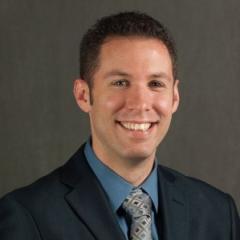
Volunteer of the Month: Cantor Jamie Marx
Jamie is a graduate of HUC-JIR DFSSM. He is the cantor at Temple Sholom in Broomall in Broomall, Pennsylvania.
In what capacity have you volunteered for the ACC? Did someone approach you? How did you get started?
I’ve been chairing the ACC new website task force for the past three years. Susan Caro who was president at the time asked me. They knew they wanted to redo it and someone had given them my name. I was a software developer and studied computer science in college before I switched to music. I’ve been a tech enthusiast for a long time. I volunteered with social media for the 2013 convention. Helped out with Facebook advertising, etc.
What’s the best part of being a cantor?
The best part is that I get to sing and play guitar for a living! When I was a music major I believed that some of us would get to perform and the rest of us would end up as music teachers or in the corporate world. I never thought that I’d have a career where I could perform. But this job allows me to blend all I love about Judaism and all I love about music. I spend my days geeking out about all the things I love. Also, I enjoy working with people everyday. I went into the cantorate so I could hear people’s stories and to be with people in good times and difficult times.
In your experience and perspective what do see as the biggest challenge facing the cantorate today and in the future?
One of the biggest problems is discovering the limits of what we can demand of people. What that means is that every program we think of, every song we want to bring to the community, every ritual or holiday we want to bring people into or expose them to, has to be thought out from a new perspective. Once upon a time you could just say to someone in town come to our synagogue. It’s not been true for a while, and it’s becoming less and less true. It’s requiring us to rethink our role as a cantor and what music we bring, in terms of the style of worship we might choose. We have to really consider where people are coming from and how to meet them where they are, rather than where we are in the synagogue.
How and why did you choose to become a cantor?
I had a calling. It was on a Friday night during services, during the Aleinu. I had an experience of God that I couldn’t articulate what it meant; it was a physical sensation in my chest. And when I got into the car after services, I told my wife, “I think I’m going to apply to cantorial school.”
It sounds funny. Obviously, I was a singer. I was in Hillel in college. I attended synagogue semi-regularly even as a twenty-four year old. I was a bit out of the norm, but that’s what happened. You know people would say, ‘you’re Jewish and you sing, you should be a cantor’, but I never took it seriously at all. So once I had this calling, I looked into HUC and the more I read about it, the more it felt as the right place for me. The longer I’ve been doing this work, the truer this has become. It’s the place where I’m supposed to be.
Tell us one thing about yourself that we don’t know and that you’d like to share.
I love writing parodies. I’ve been doing it since I was a little kid. I have a whole philosophy and process and approach to what makes a good parody. My class knows it. I wrote a parody for my ACC class every year starting with a parody of “Seasons of Love” for a beit café night in Jerusalem.

